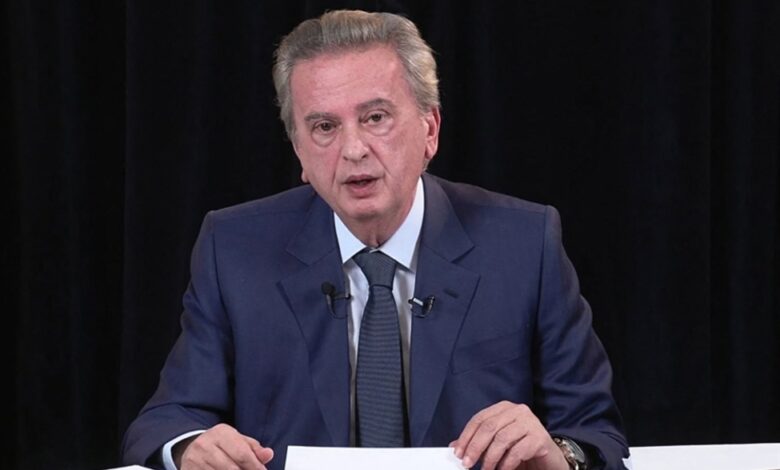فجأة ومن دون أي مقدمات ظهر الحاكم السابق للبنك المركزي رياض سلامة في قصر العدل، بعد أشهر طويلة من الملاحقة القانونية وعدم العثور عليه، لتبليغه بضرورة الحضور إلى التحقيق بقضايا فساد وتبديد مال عام وتبييض أموال وإثراء غير مشروع واستغلال وظيفي… وتطول لائحة الاتهامات الموجهة إلى سلامة من القضاء اللبناني تتقدمه المدعية العامة في جبل لبنان القاضية غادة عون، ومن القضاء الخارجي لا سيما في فرنسا وألمانيا ولوكسمبورغ..
دخل سلامة قصر عدل بيروت من دون محاميه، واثقاً بالمغادرة والعودة إلى بيته، لكنّ حسابات حقله لم تتطابق مع بيادر السلطة، التي أمّنت له ولنفسها الحماية منذ بدأت روائح الفساد والهدر والصفقات المشبوهة، تزكم أنوف اللبنانيين والمودعين والمتعاملين مع لبنان في أنحاء العالم، ليتفاجأ بعد نحو ثلاث ساعات من التحقيق أمام المدعي العام التمييزي القاضي جمال الحجار بصدور مذكرة توقيف إحترازي بحقه لمدة أربعة أيام، وينقل إلى ما يُعرف بنظارة الضباط الأربعة في الأشرفيه، الذين تمّ توقيفهم من قضية اغتيال الرئيس الشهيد رفيق الحريري قبل أن تظهر براءتهم.
فما الذي تغير لتوقف السلطات اللبنانية حاكماً للبنك المركزي لأكثر من اثنتين وثلاثين سنة؟ وهل سقطت مظلة الحماية الداخلية التي حالت دون محاكمته في الداخل والخارج؟
بداية لم يقبض اللبنانيون هذا التوقيف على محمل الجد، وقد ضجّت مواقع التواصل الاجتماعي بآرائهم الساخرة، التي اعتبرت أن التوقيف لا يعدو كونه مسرحية ستنتهي قريباً، وجاءت لسحب ملاحقته من يد القضاء الخارجي إلى القضاء اللبناني، قبل أن يكشف سلامة المستور السياسي وشركاء الفساد أو رؤوس الفساد، التي غطاها بثمنٍ باهظ على مدى سنوات حاكميته للمركزي.
وفي حين سارع الرئيس نجيب ميقاتي إلى غسل يديه من توقيف سلامة مؤكداً أنه لن يتدخل بعمل القضاء، أعلنت القاضية عون استعدادها لتولي التحقيق مع سلامة من حيث انتهت. وأمس أوضح القاضي الحجار أن ملف الموقوف احترازياً الحاكم السابق لمصرف لبنان رياض سلامة سيسلك مجراه القانوني، وسيتم تحويله الى قاضي التحقيق.
ومع مجموعة التساؤلات الطويلة حول المتغيرات التي أوقعت بسلامة تكشف معلومات خاصة بموقع “ليبانون فايلز” أن ضغوطاً خارجية مورست على القضاء اللبناني لإصدار مذكرة توقيف بحقه، وأن قاضيين فرنسيين بارزين أحدهما يدعى “سيرج تونار” زارا منذ شهر تقريباً المدعي العام التمييزي القاضي الحجار في مكتبه في بيروت، وتونار يتابع ملف سلامة في فرنسا، وكلنا يذكر التحقيق مع شقيق سلامة في باريس في قضية شركة “أوبتيموم” منذ نحو شهر.
وتشير المعلومات الخاصة إلى أن اللقاء مع الحجار حمل إحراجاً كبيراً له والقضاء اللبناني، إذ سأل القاضيان الفرنسيان “كيف لا تعرفون مكان سلامة وبحقه مذكرات توقيف لبنانية وخارجية وبلاغ بحث وتحر، وهو يتنقل بكل حرية؟” فكان استدعاؤه إلى التحقيق الذي تلاه صدور مذكرة التوقيف الاحترازي.
وتربط المعلومات بين توقيفه ومخاطر إدراج لبنان على اللائحة الرمادية في التعامل المالي الدولي وكل تداعيات هكذا إدراج، مشيرة إلى أن الاقتصادي النقدي يسير من دون أي رقابة، فالمصارف تفتح حسابات لمودعين بالفريش دولار، تبلغ أحياناً مئة ألف دولار من دون التحرّي عن مصدر هذه الاموال، أكان تجارة المخدرات أو تجارة السلاح أو تبييض أموال.. فيبدو لبنان مزراباً لتبييض العملة خلافاً للقانون الدولي، وقد أُبلغ الحاكم بالإنابة وسيم منصوري لدى زيارته واشنطن أن من غير المسموح أن يكون في منازل اللبنانيين نحو سبعة مليارات دولار كاش لا أحد يعرف مصادرها.
وبانتظار انقضاء فترة التوقيف الاحترازي، تبقى العين على ما قد يحدث في الشارع، فإن أُطلق سراحه سنكون أمام تظاهرات غاضبة، وإن أُبقي موقوفاً لفترة طويلة سيبدأ سلامة بكشف كل ما يملك من معلومات تطال سياسيين كباراً، انطلاقاً من رفضه أن يكون كبش محرقة، فهل سيسمحون بكشفه المستور المالي، لمعرفة أسباب الانهيار والمزاريب التي أودت بالودائع إلى غير رجعة؟ أم تبدأ لفلفة القضية بعد استعادتها من الخارج؟
المصدر: lebanonfiles news
### After Salameh's Arrest: What If He's Released, and What If the Truth Is Revealed?
In a sudden and unexpected move, former Central Bank Governor Riad Salameh appeared at the Beirut courthouse after months of legal pursuits and being elusive. Salameh faced numerous charges, including corruption, embezzlement, money laundering, illicit enrichment, and abuse of office. The list of accusations is extensive, led by Lebanese prosecutor Ghada Aoun in Mount Lebanon, as well as international authorities in France, Germany, and Luxembourg.
Salameh arrived at the Beirut courthouse without his legal team, seemingly confident that he would leave freely and return home. However, things didn’t go as he had anticipated. Despite years of protection from the establishment, shielding him from scandals of corruption, waste, and shady deals that have plagued Lebanon, after three hours of questioning before Public Prosecutor Judge Jamal Al-Hajjar, an arrest warrant was issued against him. He was detained for four days in a detention center known for holding the “Four Generals,” who were implicated in the assassination of former Prime Minister Rafic Hariri before being cleared of charges.
So, what has changed for Lebanese authorities to arrest a man who had served as Central Bank governor for over 32 years? Has the internal protection that prevented his prosecution both at home and abroad finally fallen?
Initially, many Lebanese took the arrest lightly, with social media users mocking the situation as a mere theatrical show, expected to end soon. Many believe the arrest is intended to transfer the case from international courts to Lebanese jurisdiction before Salameh can expose sensitive political secrets or reveal the identities of key corruption figures he protected during his tenure.
Meanwhile, Prime Minister Najib Mikati distanced himself from the arrest, declaring he would not interfere in judicial matters. Judge Aoun also expressed readiness to continue her investigation into Salameh’s case. Yesterday, Judge Al-Hajjar clarified that Salameh’s case would follow its legal course and be referred to the investigating judge.
Amid numerous questions surrounding the sudden turn of events, **Lebanon Files** revealed that external pressure had been applied on Lebanese authorities to issue an arrest warrant. French Judge Serge Tournare, who is following Salameh’s case in France, reportedly visited Al-Hajjar in Beirut around a month ago. During the meeting, Tournare raised concerns about Salameh’s whereabouts and why Lebanese authorities were unable to locate him despite local and international arrest warrants being issued. This meeting led to Salameh’s summoning and subsequent detention.
The arrest is also tied to the risk of Lebanon being placed on the gray list for international financial transactions, which could have severe consequences. There have been allegations that Lebanon’s banking system lacks oversight, with some banks opening fresh dollar accounts worth as much as $100,000 without verifying the sources of the funds, raising suspicions of drug or arms trade and money laundering. In fact, acting Central Bank Governor Wassim Mansouri was reportedly warned during his visit to Washington that it was unacceptable for $7 billion in cash to circulate in Lebanese homes without any trace of its origins.
As Salameh remains in precautionary detention, all eyes are on what happens next. If he’s released, Lebanon could witness public outrage and protests. If his detention is prolonged, Salameh may begin exposing political figures, unwilling to become a scapegoat. Will the powerful allow him to reveal the financial secrets behind Lebanon’s collapse and the loss of depositors' money? Or will the case be swept under the rug as Lebanese authorities reclaim control from international courts?
translated by international scopes team







